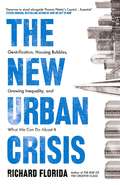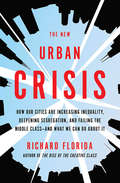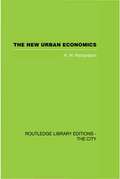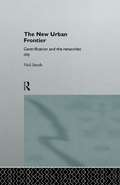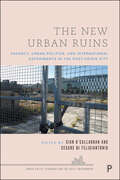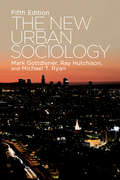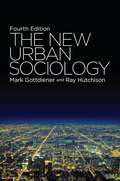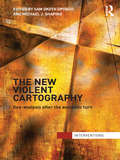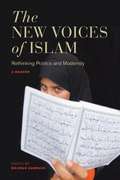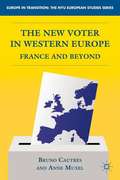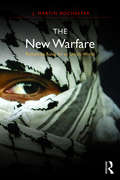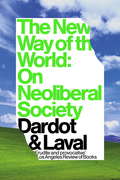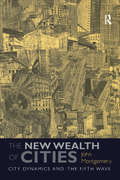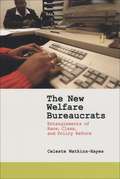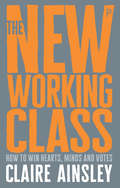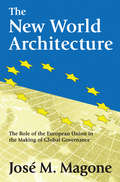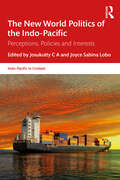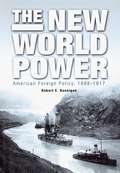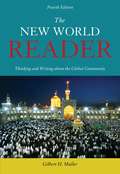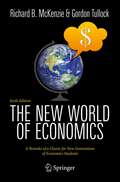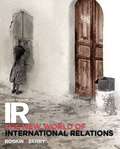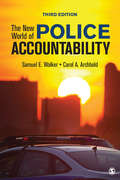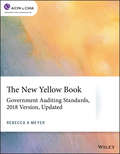- Table View
- List View
The New Urban Crisis: Gentrification, Housing Bubbles, Growing Inequality, and What We Can Do About It
by Richard FloridaNever before have our cities been as important as they are now. The drivers of innovation and growth, they are essential to the prosperity of nations. But they are also destructive, plunging us into housing crises and deepening inequality. How can we keep the good and break free of the bad? In this bracingly original work of research and analysis, leading urbanist Richard Florida explores the roots of this new crisis and puts forward a plan to make this the century of the fairer, thriving metropolis.
The New Urban Crisis: How Our Cities Are Increasing Inequality, Deepening Segregation, and Failing the Middle Classand What We Can Do About It
by Richard FloridaIn recent years, the young, educated, and affluent have surged back into cities, reversing decades of suburban flight and urban decline. And yet all is not well, Richard Florida argues in The New Urban Crisis. Florida, one of the first scholars to anticipate this back-to-the-city movement in his groundbreaking The Rise of the Creative Class, demonstrates how the same forces that power the growth of the world's superstar cities also generate their vexing challenges: gentrification, unaffordability, segregation, and inequality. Meanwhile, many more cities still stagnate, and middle-class neighborhoods everywhere are disappearing. Our winner-take-all cities are just one manifestation of a profound crisis in today's urbanized knowledge economy. A bracingly original work of research and analysis, The New Urban Crisis offers a compelling diagnosis of our economic ills and a bold prescription for more inclusive cities capable of ensuring growth and prosperity for all.
The New Urban Frontier: Gentrification and the Revanchist City
by Neil SmithWhy have so many central and inner cities in Europe, North America and Australia been so radically revamped in the last three decades, converting urban decay into new chic? Will the process continue in the twenty-first century or has it ended? What does this mean for the people who live there? Can they do anything about it? This book challenges conventional wisdom, which holds gentrification to be the simple outcome of new middle-class tastes and a demand for urban living. It reveals gentrification as part of a much larger shift in the political economy and culture of the late twentieth century. Documenting in gritty detail the conflicts that gentrification brings to the new urban 'frontiers', the author explores the interconnections of urban policy, patterns of investment, eviction, and homelessness. The failure of liberal urban policy and the end of the 1980s financial boom have made the end-of-the-century city a darker and more dangerous place. Public policy and the private market are conspiring against minorities, working people, the poor, and the homeless as never before. In the emerging revanchist city, gentrification has become part of this policy of revenge.
The New Urban Ruins: Vacancy, Urban Politics and International Experiments in the Post-Crisis City (Urban Policy, Planning and the Built Environment)
by Cian O’Callaghan and Cesare Di FeliciantonioThis book provides an innovative perspective to consider contemporary urban challenges through the lens of urban vacancy. Centering urban vacancy as a core feature of urbanization, the contributors coalesce new empirical insights on the impacts of recent contestations over the re-use of vacant spaces in post-crisis cities across the globe. Using international case studies from the Global North and Global South, it sheds important new light on the complexity of forces and processes shaping urban vacancy and its re-use, exploring these areas as both lived spaces and sites of political antagonism. It explores what has and hasn’t worked in re-purposing vacant sites and provides sustainable blueprints for future development.
The New Urban Sociology
by Ray Hutchison Mark Gottdiener Michael T. RyanWidely recognized as a groundbreaking text, The New Urban Sociology is a broad and expert introduction to urban sociology that is both relevant and accessible to the student. A thought leader in the field, the book is organized around an integrated paradigm-the sociospatial perspective-which considers the role played by social factors such as race, class, gender, lifestyle, economics, culture, and politics on the development of metropolitan areas. Emphasizing the importance of space to social life and real estate to urban development, the book integrates social, ecological and political economy perspectives and research through a fresh theoretical approach. With its unique perspective, concise history of urban life, clear summary of urban social theory, and attention to the impact of culture on urban development, this book gives students a cohesive conceptual framework for understanding cities and urban life. In this thoroughly revised 5th edition, authors Mark Gottdiener, Ray Hutchison, and Michael T. Ryan offer expanded discussions of created cultures, gentrification, and urban tourism, and have incorporated the most recent work in the field throughout the text. The New Urban Sociology is a necessity for all courses on the subject.
The New Urban Sociology
by Ray Hutchison Mark GottdienerNow revised and updated, this groundbreaking text utilizes an integrated sociospatial paradigm to consider the role of race, class, gender, lifestyle, economics, culture, and politics on the development of metropolitan areas.
The New Urban Sociology
by Ray Hutchison Mark Gottdiener Michael T. RyanWidely recognized as a groundbreaking text, The New Urban Sociology is a broad and expert introduction to urban sociology that is both relevant and accessible to the student. A thought leader in the field, the book is organized around an integrated paradigm--the sociospatial perspective--which considers the role played by social factors such as race, class, gender, lifestyle, economics, culture, and politics on the development of metropolitan areas. Emphasizing the importance of space to social life and real estate to urban development, the book integrates social, ecological and political economy perspectives and research through a fresh theoretical approach. With its unique perspective, concise history of urban life, clear summary of urban social theory, and attention to the impact of culture on urban development, this book gives students a cohesive conceptual framework for understanding cities and urban life. In this thoroughly revised 5th edition, authors Mark Gottdiener, Ray Hutchison, and Michael T. Ryan offer expanded discussions of created cultures, gentrification, and urban tourism, and have incorporated the most recent work in the field throughout the text. The New Urban Sociology is a necessity for all courses on the subject.
The New Violent Cartography: Geo-Analysis after the Aesthetic Turn (Interventions)
by Michael J. Shapiro Sam Okoth OpondoThis edited volume seeks to propose and examine different, though related, critical responses to modern cultures of war among other cultural practices of statecraft. Taken together, these essays present a space of creative engagement with the political and draw on a broad range of cultural contexts and genres of expressions to provoke the thinking that exceeds the conventional stories and practices of international relations. In contrast to a macropolitical focus on state policy and inter-state hostilities, the contributors to this volume treat the micropolitics of violence and dissensus that occur below [besides and against] the level and gaze that comprehends official map-making, policy-making and implementation practices. At a minimum, the counter-narratives presented in these essays disturb the functions, identities, and positions assigned by the nation-state, thereby multiplying relations between bodies, the worlds where they live, and the ways in which they are ‘equipped’ for fitting in them. Contributions deploy feature films, literature, photography, architecture to think the political in ways that offer glimpses of realities that are fugitive within existing perspectives. Bringing together a wide range of theorists from a host of geographical, cultural and theoretical contexts, this work explores the different ways in which an aesthetic treatment of world politics can contribute to an ethics of encounter predicated on minimal violence in encounters with people with different practices of identity. This work provides a significant contribution to the field of international theory, encouraging us to rethink politics and ethics in the world today.
The New Voices of Islam: Rethinking Politics and Modernity -- A Reader
by Mehran KamravaAt a time in our post-9/11 world when fundamentalist forces appear to dominate Islam, a vibrant and consequential discourse has emerged from many prominent writers seeking to change the direction of Muslim thought. This timely volume, representing a broad cross-section of this reformist trend in countries ranging from Malaysia to Algeria and Morocco, brings together the writings of thirteen of the most renowned and influential Muslim thinkers alive today. Individually and collectively, they argue for reforms in Islamic theology and jurisprudence and for reinterpretations of popular notions of Islam that are consistent with and supportive of the tenets of modern life. Their essays include broad overviews of Islam, its core principles, and the complex relationship between Islam, democracy, and civil rights; three works by Muslim feminist intellectuals; and more. The volume also places the life, career, and arguments of each thinker in national and historical context. "Copub: I. B. Tauris "
The New Voter in Western Europe: France And Beyond (Europe In Transition: The Nyu European Studies Ser.)
by Bruno Cautrès Anne MuxelThis book presents the main results of an electoral panel survey which is both unique and innovative in French electoral research and among the most detailed panel study in Europe. The survey was conducted among a sample of 1,846 French voters interviewed on four waves during the 2007 presidential and legislative elections in the context of Nicolas Sarkozy's victory. The analysis provides an understanding of how decisions on voting are made, the process of electoral decision-making and also the mechanisms used by the voter to make a choice and attempts to identify the social, political, and psychological factors at play.
The New Warfare: Rethinking Rules for an Unruly World
by J. Martin RochesterThis book looks at the evolving relationship between war and international law, examining the complex practical and legal dilemmas posed by the changing nature of war in the contemporary world, whether the traditional rules governing the onset and conduct of hostilities apply anymore, and how they might be adapted to new realities. War, always messy, has become even messier today, with the blurring of interstate, intrastate, and extrastate violence. How can the United States and other countries be expected to fight honourably and observe the existing norms when they often are up against an adversary who recognizes no such obligations? Indeed, how do we even know whether an "armed conflict" is underway when modern wars tend to lack neat beginnings and endings and seem geographically indeterminate, as well? What is the legality of anticipatory self-defense, humanitarian intervention, targeted killings, drones, detention of captured prisoners without POW status, and other controversial practices? These questions are explored through a review of the United Nations Charter, Geneva Conventions, and other regimes and how they have operated in recent conflicts. Through a series of case studies, including the U.S. war on terror and the wars in Afghanistan, Iraq, Gaza, Kosovo, and Congo, the author illustrates the challenges we face today in the ongoing effort to reduce war and, when it occurs, to make it more humane.
The New Way Of The World
by Gregory Elliott Christian Laval Pierre DardotExploring the genesis of neoliberalism, and the political and economic circumstances of its deployment, Pierre Dardot and Christian Laval dispel numerous common misconceptions. Neoliberalism is neither a return to classical liberalism nor the restoration of "pure" capitalism. To misinterpret neoliberalism is to fail to understand what is new about it: far from viewing the market as a natural given that limits state action, neoliberalism seeks to construct the market and make the firm a model for governments. Only once this is grasped will its opponents be able to meet the unprecedented political and intellectual challenge it poses.
The New Wealth of Cities: City Dynamics and the Fifth Wave
by John MontgomeryOver the past two decades, city economies have restructured in response to the decline of older industries. This has involved new forms of planning and urban economic development, a return to traditional concerns of city building and a focus on urban design. During this period, there has also been a marked rise in our understanding of cultural development and its role in the design, economy and life of cities. In this book, John Montgomery argues that this amounts to a shift in urban development. He provides a long overdue look at the dynamics of the city, that is, how cities work in relation to the long cycles of economic development and suggests that a new wave of prosperity, built on new technologies and new industries, is just getting underway in the Western world. The New Wealth of Cities focuses on what effect this will have on cities and city regions and how they should react. Original and wide-ranging, this book will be a definitive resource on city economies and urban planning, explaining why it is that cities develop over time in periods of propulsive growth and bouts of decline.
The New Welfare Bureaucrats: Entanglements of Race, Class, and Policy
by Celeste Watkins-HayesA behind-the-scenes look at bureaucracy's human face, The New Welfare Bureaucrats is a compelling study of welfare officers and how they navigate the increasingly tangled political and emotional terrain of their jobs.
The New Working Class: How to Win Hearts, Minds and Votes
by Claire AinsleyRecent events such as the Brexit vote and the 2017 general election result highlight the erosion of traditional class identities and the decoupling of class from political identity. The majority of people in the UK still identify as working class, yet no political party today can confidently articulate their interests. So who is now working class and how do political parties gain their support? Based on the opinions and voices of lower and middle income voters, this insightful book proposes what needs to be done to address the issues of the 'new working class'. Outlining the composition, values, and attitudes of the new working class, it provides practical recommendations for political parties to reconnect with the electorate and regain trust.
The New World Architecture: The Role of the European Union in the Making of Global Governance
by Jose MagoneThe collapse of the bipolar world sustained by the United States and the former Soviet Union led to a power vacuum in the 1990s that the European Union has only reluctantly begun to fill. It is under pressure to take over important international tasks and roles in order to develop a new equilibrium in the system of international relations. After 2000, reforms were undertaken so that the European Union could deal more efficiently with the tasks the new political system had acquired since the early 1990s. With respect to its international role, reorganization of the EU's external relations department was high on the list. The New World Architecture explores the contribution that the European Union is making to the emerging global governance system. It discusses the theoretical and historical aspects of European integration within the framework of the emerging regional EU and global governance systems. It explores three regimes of governance that are contributing to holding together the new emerging EU multilevel governance system. None of these is complete; all are partial. They include the political regime of governance; the socioeconomic regime of governance; and the territorial regime of governance. The author assesses the impact of the European Union on global politics. The Mediterranean and Latin America represent regions in which the European Union is investing considerable effort in order to create new forms of cooperation. Magone argues that within the next twenty-five years global governance may and should emerge as the new and reconfigured stable system of international relations. In this system, the European Union is and will remain the most advanced regional system. This volume will be of interest to specialists, scholars, and students of European Politics and the European Union.
The New World Politics of the Indo-Pacific: Perceptions, Policies and Interests (Indo-Pacific in Context)
by Josukutty C A and Joyce Sabina LoboThe book offers a vivid analysis of the new geopolitics in the Indo-Pacific in terms of big power rivalry between the US-China and country-wise perspectives situating largely within the late 2000s and culminates with the developments of the COVID-19 period. The great power shift, marked by the rise of China and the relative decline of the US, poses a serious challenge to the balance of power in the Indo-Pacific region and the world order in general. Ironically, the play of realism in the region is stymied by broad partnerships of key countries that utilise the liberal approaches of cooperation with both rivals – the US and China. The book captures the mosaic of stakeholders – rivals the US and China along with Russia; other QUAD members Australia, India, and Japan; key ASEAN members, Indonesia, Malaysia, Singapore, and Vietnam; vulnerable states in East Asia, viz. Taiwan and South Korea; and groupings including the ASEAN and QUAD – that constitute the new world politics of the Indo-Pacific.The volume will be of great interest to scholars and researchers of Indo-Pacific studies, global politics, and international relations.
The New World Power
by Robert E. HanniganFrom the era of the Spanish American war onward, the United States found itself increasingly involved in the affairs of countries beyond North America. The New World Power offers an interpretive framework for understanding U.S. foreign policy during the first two decades of America's emergence as a world power. Robert E. Hannigan describes the aspirations of American leaders, explores the bedrock social views and ideological framework they held in common, and shows how the approach of U.S. policymakers overseas mirrored their attitudes toward domestic progressivism. While the vast bulk of work on U.S. foreign policy has been concerned with the period from World War II to the present, this comprehensive examination of American policy at the turn of the twentieth century is of vital importance to the comprehension of subsequent events.Hannigan relates U.S. foreign policy to domestic society in ways that are new; in particular, he examines how issues of class, race, and gender were combined in the ideology held by policy makers and how this shaped their approaches to foreign affairs. His study reveals a fundamental unity to U.S. activity throughout the period, not only toward the Caribbean and China, regions that have been the traditional focus of historians, but toward the rest of North and South America as well. It also relates these regional activities to American policy toward the British Empire, European great power rivalries, and international institutions, arbitration, and law, culminating in a reinterpretation of U.S. involvement in World War I.Based on exhaustive research in the writings of presidents, secretaries of state, and key diplomats and advisers, The New World Power draws parallels between the methods by which policy makers sought to shape international society and the methods by which many of them hoped to secure the conditions they wanted within the United States. Most important, the book describes how an international search for order constituted the fundamental strategy by which American leaders sought to ensure for the United States a position of what they saw as wealth and greatness in the coming twentieth-century world.
The New World Reader
by Gilbert H. MullerWith compelling selections by some of the world's most respected and critically acclaimed writers, THE NEW WORLD READER, Fourth Edition, encourages exploration of the significant global challenges of the 21st century. Students gain a deeper understanding of the topics that affect their lives, such as the challenges and consequences of globalization, global warming, bilingual education, and redefined gender roles. Challenged by such notable contemporary thinkers and writers as Elie Wiesel, Fareed Zakaria, Richard Rodriguez, Edwidge Danticat, and Jane Goodall, students develop their reading and critical-thinking skills. A consistent pedagogical apparatus includes brief chapter introductions, author headnotes, and pre-reading questions that offer students a preview of the central theme in each section. Exercise sets follow each essay, providing for deeper writing, reading, and discussion opportunities.
The New World of Economics: A Remake of a Classic for New Generations of Economics Students
by Richard B. Mckenzie Gordon TullockThe New World of Economics, 6th edition, by Richard McKenzie and Gordon Tullock, represents a revival of a classic text that, when it was first published, changed substantially the way economics would be taught at the introductory and advanced levels of economics for all time. In a very real sense, many contemporary general-audience economics books that seek to apply the "economic way of thinking" to an unbounded array of social issues have grown out of the disciplinary tradition established by earlier editions of The New World of Economics. This new edition of The New World will expose new generations of economics students to how McKenzie and Tullock have applied in a lucid manner a relatively small number of economic concepts and principles to a cluster of topics that have been in the book from its first release and to a larger number of topics that are new to this edition, with the focus of the new topics on showing students how economic thinking can be applied to business decision making. This edition continues the book's tradition of taking contrarian stances on important economic issues. Economics professors have long reported that The New World is a rare book in that students will read it without being required to do so.
The New World of International Relations 10th Ed
by Michael G. Roskin Nicholas O. BerryA down-to-earth approach to contemporary international relations IR: The New World of International Relations provides students with a direct and down-to-earth understanding of contemporary international relations. This text surveys key events in world history as well as fundamental theoretical concepts to trace the international system's evolution and to assess its future. Putting the behavior of global actors into more complete context, IR helps students think critically about the challenges faced by the United States in an era of globalization.
The New World of Police Accountability
by Carol A. Archbold Samuel E. Walker"This book gives a brief yet thorough summary of the main components of police accountability in the 21st century. What works, what doesn’t, and where are we going in the future? I love to use it with my undergraduate students to help them understand the complexities of policing in the modern era." —Janne E. Gaub, East Carolina University Completely revised to cover recent events and research, the Third Edition of The New World of Police Accountability provides an original and comprehensive analysis of some of the most important developments in police accountability and reform strategies. With a keen and incisive perspective, esteemed authors and policing researchers, Samuel Walker and Carol Archbold, address the most recent developments and provide an analysis of what works, what reforms are promising, and what has proven unsuccessful. The book’s analysis draws on current research, as well as the President′s Task Force on 21st Century Policing and the reforms embodied in Justice Department consent decrees. New to the Third Edition: The national crisis over police legitimacy and use of force, is put into context through extensive discussions of recent police shootings and the response to this national crisis, providing readers a valuable perspective on the positive steps that have been taken and the limits of those steps. Coverage of the issues related to police officer uses of force is now the prevailing topic in Chapter 3 and includes detailed discussion of the topic, including de-escalation, tactical decision making, and the important changes in training related to these issues. An updated examination of the impact of technology on policing, including citizens’ use of recording devices, body-worn cameras, open data provided by police agencies, and use of social media, explores how technology contributes to police accountability in the United States. A complete, up-to-date discussion of citizen oversight of the police provides details on the work of selected oversight agencies, including the positive developments and their limitations, enabling readers to have an informed discussion of the subject. Detailed coverage of routine police activities that often generate public controversy now includes such topics as responding to mental health calls, domestic violence calls, and police "stop and frisk" practices. Issues related to policing and race relations are addressed head-on through a careful examination of the data, as well as the impact of recent reforms that have attempted to achieve professional, bias-free policing.
The New World of Police Accountability: Cox: Introduction To Policing, 2e + Walker: The New World Of Police Accountability, 2e
by Carol A. Archbold Samuel E. Walker"This book gives a brief yet thorough summary of the main components of police accountability in the 21st century. What works, what doesn’t, and where are we going in the future? I love to use it with my undergraduate students to help them understand the complexities of policing in the modern era." —Janne E. Gaub, East Carolina University Completely revised to cover recent events and research, the Third Edition of The New World of Police Accountability provides an original and comprehensive analysis of some of the most important developments in police accountability and reform strategies. With a keen and incisive perspective, esteemed authors and policing researchers, Samuel Walker and Carol Archbold, address the most recent developments and provide an analysis of what works, what reforms are promising, and what has proven unsuccessful. The book’s analysis draws on current research, as well as the President′s Task Force on 21st Century Policing and the reforms embodied in Justice Department consent decrees. New to the Third Edition: The national crisis over police legitimacy and use of force, is put into context through extensive discussions of recent police shootings and the response to this national crisis, providing readers a valuable perspective on the positive steps that have been taken and the limits of those steps. Coverage of the issues related to police officer uses of force is now the prevailing topic in Chapter 3 and includes detailed discussion of the topic, including de-escalation, tactical decision making, and the important changes in training related to these issues. An updated examination of the impact of technology on policing, including citizens’ use of recording devices, body-worn cameras, open data provided by police agencies, and use of social media, explores how technology contributes to police accountability in the United States. A complete, up-to-date discussion of citizen oversight of the police provides details on the work of selected oversight agencies, including the positive developments and their limitations, enabling readers to have an informed discussion of the subject. Detailed coverage of routine police activities that often generate public controversy now includes such topics as responding to mental health calls, domestic violence calls, and police "stop and frisk" practices. Issues related to policing and race relations are addressed head-on through a careful examination of the data, as well as the impact of recent reforms that have attempted to achieve professional, bias-free policing.
The New Yellow Book: Government Auditing Standards (AICPA)
by Rebecca A. MeyerIt is essential all auditors performing Yellow Book audits understand the recently revised concepts and standards of generally accepted government auditing standards (GAGAS). This book provides a baseline of information for accountants to gain an understanding of the new Yellow Book (2018 revision of Government Auditing Standards). Featuring new guidance related to independence and peer review, this book will increase your knowledge of the requirements and application guidance related to: Ethics Independence Standards for financial audits Attestation engagements Performance audits Key topics covered include: Foundation and principles for the use and application of generally accepted government auditing standards (GAGAS) General requirements for complying with the Yellow Book Ethics, independence, and professional judgment Competence and continuing professional education Quality control and peer review Standards for financial audits Standards for attestation engagements and reviews of financial statements Fieldwork standards for performance audits Reporting standards for performance audits
